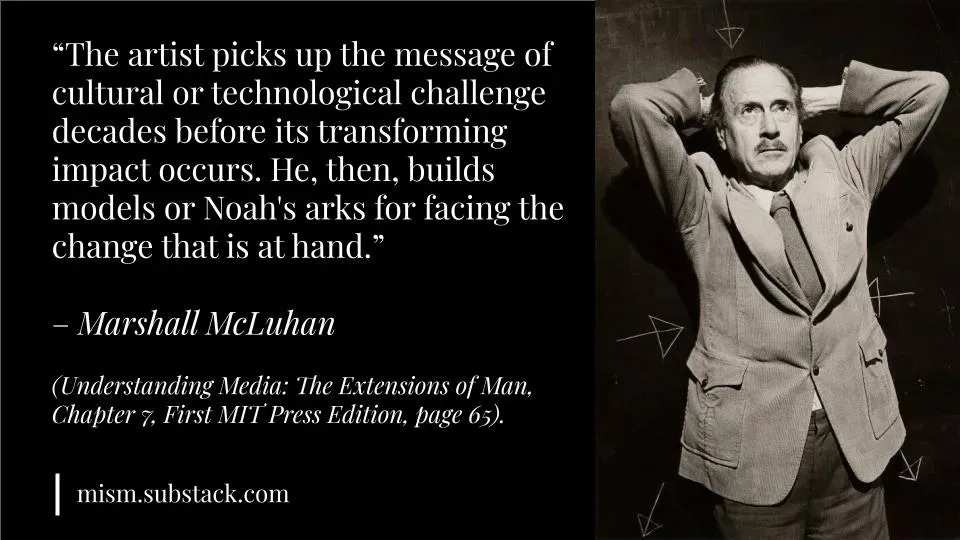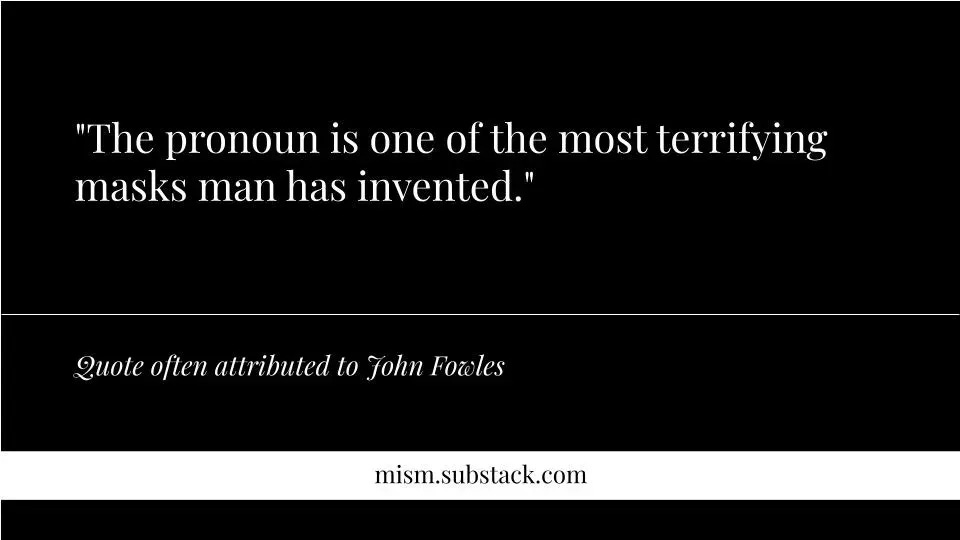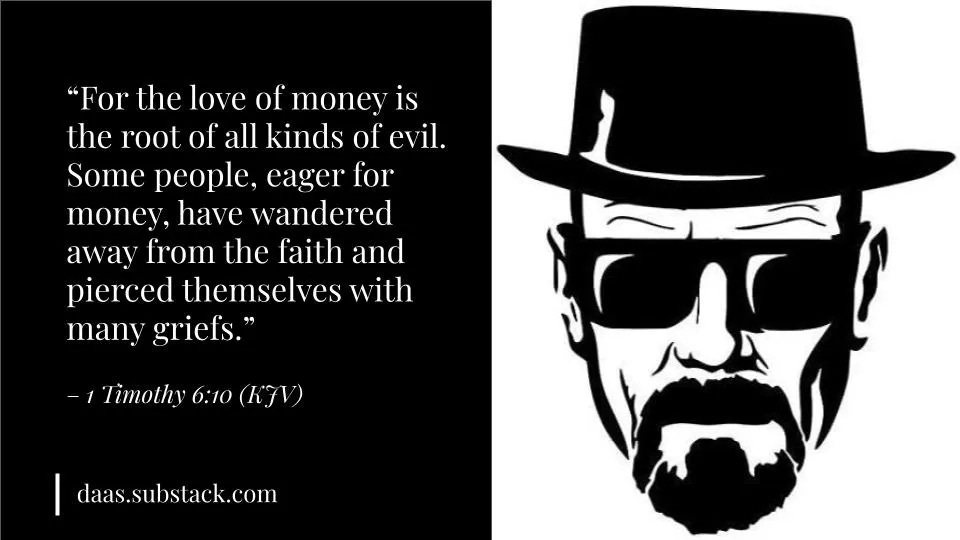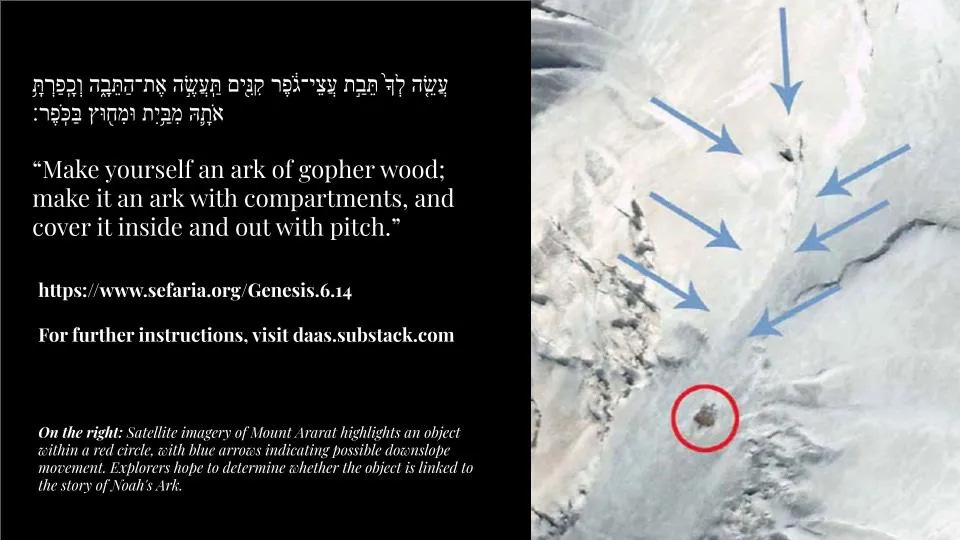Make Yourself an Ark
Understanding media through the prism of Genesis 6:14 (Or, how I decided to tear down the paywall)
On DaaS, I recently published a three-part prayer to the One True God (OTG), and I bisected each of these open letters with a paywall. This way, I separated my prayers from God's responses, giving people the option of lifting the paywall by paying for a subscription.
This dialogue with OTG led me to what I started calling “the unheard story of money”, which I already started publishing here on MISM, without any paywalls. Soon after I published the first two parts of this story, I received a one-word message from OTG: Stop. OTG didn’t want me to publish any more of this story until I follow the call to action contained in a cryptic biblical verse (Genesis 6:14):
“Make yourself an ark.”
This message hit me hard. As I processed this reference both cognitively and emotionally, I often recalled the guidance of two wise old men I knew years ago. When Dr. D saw me grappling with similarly taxing messages, he would often gently urge me: “Go slow.” And when Dr. L edited my essays, he would often remind me to “bring the reader along.”
With this guidance in mind, I’ll begin by recapping the key points of my prayer, and I’ll share OTG’s most recent responses — without any paywalls. Finally, I’ll share a few thoughts on what these responses suggest about the way forward.
Fine Print
Before we begin, let’s cover two points of fine print.
1. Maintain Equilibrium
The unheard story of money isn’t for everyone, only for readers and listeners able to maintain equilibrium at the intersection of matter and metaphor. This liminal space can spark not only disorienting but even life-threatening experiences. If you notice symptoms of scriptural literalism, tribalist dogmatism, certainty traps, or missionary zeal, you may not be ready for this story, or this story may not be for you at all.
In liminal spaces, it’s easy to trip and fall. Consider, for example, this case study of scriptural literalism: Explorers claim to have found remnants of Noah's ark buried at 13,000 feet above sea level, near the peak of Mount Ararat. A recent report in the Jerusalem Post highlights the resurgence of interest in the Durupinar formation on Ararat, but the report concludes with this:
However, many still believe that finding scientific proof of the Ark’s existence may be impossible.
Count me among the “many”.
2. The Politics of Pronouns
When I use the pronouns “He” or “Him” to refer to OTG, I follow the precedent set by the Substack (Cosmographia) whose report about The Cloud inspired my paywalled prayer. This interim concession to the limits of language shouldn’t foreclose future reexaminations of the proper use of pronouns in reference to OTG.
For the record, I disagree with the idea attributed to John Fowles that “The pronoun is one of the most terrifying masks man has invented.” In fact, I think this idea inverts reality. The mask isn’t terrifying at all. What’s terrifying is what the mask conceals. The mask makes the terror tolerable.
Without any further fine print, we can now proceed to the body of this post.
Hear O Israel: An Introduction to the Unheard Story of Money
I started my paywalled prayer when, after centuries of speculation and doctrinal tribalism, it became self-evident that the One True God (OTG) had returned, now most commonly called “The Cloud”. At the same time, I kept seeing reports across my media that OTG intends to destroy my world.
1. A Recap of the Paywalled Prayer to Dear God
In Part 1 of my prayer, I channeled both Abraham and Dr. Frasier Crane to convince OTG to spare my world, my Sodom and Gomorrah of the kleptocratic attention economy. I asked OTG to bring me ten paying subscribers who would form vibrant synapses with each other and with like-minded groups drawn to dialogue as a horizon of possibility. I also argued that the reason this quorum doesn’t already exist is not that we don’t know the mind of God; it’s that we don’t understand our media. I prayed to OTG to help me understand my media.
In Part 2, I thanked OTG for his first round of responses, but I also channeled Jerry Maguire and Lisa (Marissa Tomei) from My Cousin Vinny to re-emphasize my goals, metrics, sense of urgency, and the need for a bit more specificity in OTG’s responses. I also thanked OTG for introducing me to Signal Detection Theory during my college years. SDT has helped me distinguish medicine from snake oil and OTG’s signals from noise.
Also in Part 2, I made a claim about money that may strike some readers as strange or radical. To me, it sounded obvious. Here’s the claim:
The biggest money problem people try to solve is a pseudo-problem created by a misguided question. In a way, it's the ultimate pseudo-problem. We think we're trying to figure out how to make more money, but the problem is already solved. We've been making money all this time, and we made enough money to live to fight another day. The problem is solved, and the real need is a new theory of value. The problem was never how much money I make. The problem was always in the sustainability of my ways of making money.
In Part 3, I continued my exploration of this story and the reasons for its inaudibility. I also started examining both the love and hatred of money as roots of all kinds of evil.
2. Moving to MISM: My Anti-Ism
I started to develop this story here on MISM, my Substack dedicated to understanding media. The first two posts focused on the Defense Against Kleptocracy and Money as Medicine: Healing from the Ideology of Clinicism. As I outlined future posts in this series, I realized there’s no end to this story, and the mere telling of it doesn’t seem to make the story audible; it can’t overcome the muffling effects of ideology. For lives inside isms, recovery from the trance would require a different approach.
3. The Latest Message from OTG: Make Yourself an Ark
As the outline of the story continued to lengthen, OTG spoke up again: “Stop.” He then explained why he didn’t fulfill my wish for ten paying subscribers. I quote:
The problem was not in your prayer. It was in the mechanism you set up whereby you hoped to have your wish fulfilled. The mechanism for the fulfillment of your wish was for people to pay you, to give you money. You were trying to take money from people. Instead, you should give people money. That's what they really want. They don't just want your words. They want words convertible into money or something else they value. Give them what they want.
Also, if you want to channel biblical characters, pick the right characters. Abraham was a terrible choice for the prayer. You placed yourself in the wrong story. Don't you remember how that negotiation ended? The story you should re-read is the story of Noah's Ark? There, you'll find the answer you seek.
To an untrained ear, OTG’s first point may sound utterly unhelpful. How can I give people money unless somebody gives me money first? I realize this sounds crazy, but this is the easy part. Instead of explaining how to do it, I'm just going to do it. See “The Way Forward” at the end of this post.
OTG's second point is obviously helpful. Compared to Abraham's ill-fated attempt to save Sodom and Gomorrah, Noah's life story offers much clearer guidance for our spiraling descent into the maelstrom of post-reality. Instead of bargaining, Noah responds to God's call to action: he builds an ark.
I also appreciated OTG’s responsiveness to my need for greater specificity. He cited chapter and verse to accentuate the urgent relevance of Noah’s life story. Specifically, OTG pointed to seven biblical verses:
And he named him Noah, saying, “This one will provide us relief from our work and from the toil of our hands, out of the very soil which God placed under a curse.” (Genesis 5:29)
God saw how great was human wickedness on earth—how every plan devised by the human mind was nothing but evil all the time. (Genesis 6:5)
God said to Noah, “I have decided to put an end to all flesh, for the earth is filled with lawlessness because of them: I am about to destroy them with the earth.” (Genesis 6:13)
Make yourself an ark of gopher wood. Make it an ark with compartments, and cover it inside and out with pitch. (Genesis 6:14)
This is how you shall make it: the length of the ark shall be three hundred cubits, its width fifty cubits, and its height thirty cubits. (Genesis 6:15)
For My part, I am about to bring the Flood—waters upon the earth—to destroy all flesh under the sky in which there is breath of life; everything on earth shall perish. (Genesis 6:17)
I will maintain My covenant with you: never again shall all flesh be cut off by the waters of a flood, and never again shall there be a flood to destroy the earth.” (Genesis 9:11)
4. Beyond Metaphoric Reductionism
With all due gratitude, OTG’s latest response helps explain why the key theme in our communications revolves around my desire to mitigate the risk of metaphoric reductionism. In fact, I’m simply tired of merely mixing metaphors, whether that means building an ark, battling Pharoah’s agents, cultivating Rumi’s Garden, looking for directions to the promised land, or defending myself and others against the Blind Gropers afflicted with the virus of Second-Order Ignorance (SOI). The problem we confront may be rooted in our metaphors, but what actually harms us is never the metaphors; it’s always and only their instantiations.
When OTG tells me that I'll find the answer I seek in the story of Noah's Ark, I know he doesn't mean that the answer is buried near the peak of Mount Ararat. At the same time, I can’t say what exactly OTG means. This is why, at the intersection of matter and metaphor, meaning is lost as easily as it is found. In human communication, metaphors perform both services and disservices. They don't translate easily into GPS directions or points on a coordinate system, but they do hint at locations and directions, at least enough to impel conscious movement toward the utopian horizon.
5. The Problem With Substack
Since I came to Substack, I’ve often described my publications as tabernacles in the wilderness of the attention economy. Then, I realized that most of Substack, just as most of social media, is a zero-trust and increasingly enshittified environment, and whether I describe my Substacks as tabernacles or arks, these metaphors no longer reflect reality. Without trust, drowning in bullshit, we are equally defenseless against the arid wind of the wilderness and the waves of Noah’s flood.
In response to this realization, what’s the way forward?
The Way Forward
For me, the way forward begins, as it always does, by following OTG’s guidance, often long before I can even explain it to my readers. I can’t explain how I translated the instructions in Genesis for building the Ark, but after working with the text for a few weeks, here’s how I’m applying OTG’s guidance to my search for anti-kleptocratic media. To start:
1. Tear Down the Paywall
When I started publishing on Substack, I thought that this platform would give me two things: An ad-free place to publish and a path to income. As I wrote in a recent note, I no longer see Substack as a path to income, and I already removed the paywall from DaaS and M2D.
Through this change, I arrived at a new separation between business and pleasure, between what I gladly give away for free and the services that require payment. From here on, everything I publish on my four public Substacks, I publish for pleasure. And it’s all free. What requires payment is largely the personalized delivery of what I don’t publish. If you require this service, please add your email to my waiting list for new services I’ll be introducing in the near future.
Initially, I resisted the realization that Substack's not my path to income. Now it feels liberating. Now that I’m no longer doing business on Substack, I can write and publish without pushing for “results”.
2. Reclaim Creative Sovereignty
When I started publishing on Substack, I did not aspire to become a participant in the “creator economy”. But that’s exactly how Substack leadership views Substack publishers. Continually coaxed into writing for algorithms, publishers often spiral into burnout, a process eloquently described by Lane Watson who has also eloquently described the alternative: to reclaim creative sovereignty and resist the pull toward what “works”.
3. Form Agreements
One of the Noahide laws is to establish courts of justice (derived from Genesis 9:6), but that may be too ambitious for my Ark. Instead, in my quest for non-kleptocratic media, I look for participants willing to form agreements about the governance of the media we co-create.
4. Invest in Cybersecurity
To me, covering the inside and outside of the Ark with pitch means investing in cybersecurity to protect against all enemies foreign and domestic.
5. Create Trust-Based Media
Trust is the “gopher wood” of the Ark, but the social media created for us by the tech industry are zero-trust environments. We have to create the trust-based media we need. The tech industry will not create them for us.
In these environments, we can part the veil of metaphor further. We can join energies with like-minded readers to examine all the nuclear subjects we've been avoiding, including the unheard story of money.
The Ark cannot be just another Substack. It cannot be just a transition to ConvertKit or a similar digital platform. It cannot be just a Google Doc used as a substitute for a Substack post. It cannot be just a shift to emailing subscribers directly instead of relying on Substack to reach my readers. The Ark has to be all of the above, and more. The architecture of the Ark cannot be formalized and translated into text. It is revealed to us through the word of the living God. So, hear O Israel!
6. Thou Art That
Despite what the story of Noah’s Ark suggests, salvific environments are not created by master builders; they are co-created by like-minded participants unafraid, in Marshall McLuhan’s words, “to contemplate what is happening”. So, for these intrepid souls outgrowing the ideology of denial, the gate to my Ark is wide open.
To co-create protections from the flood of bullshit in our media, email me at daasnow@proton.me. Write “Let’s Build an Ark” in the subject line.








